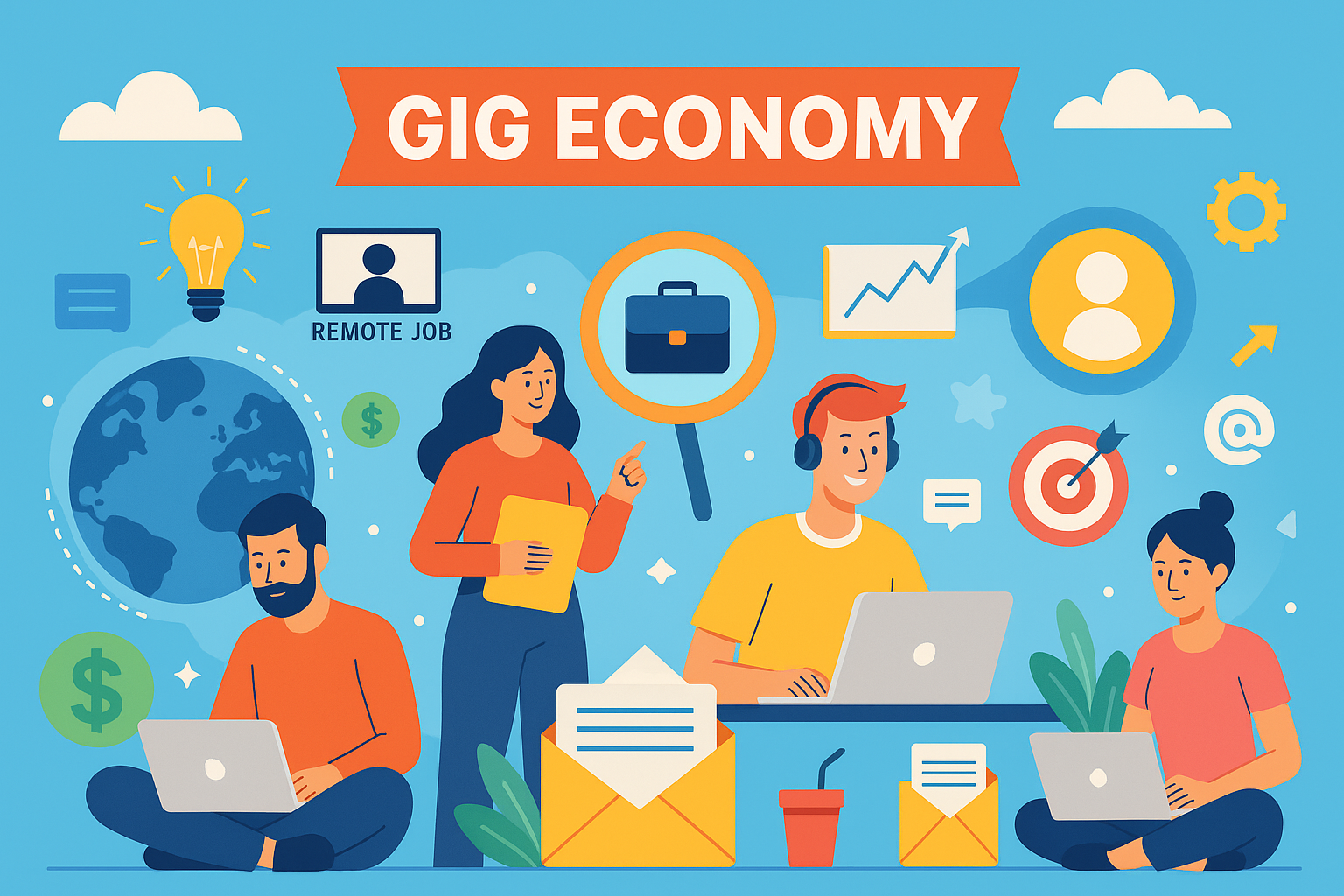The world of work is undergoing a massive transformation, and one of the most significant shifts is the rise of the gig economy. What was once seen as a side hustle or temporary work has now evolved into a thriving, permanent alternative to traditional 9-to-5 jobs. The gig economy is not just a trend—it’s the future. Whether you're a student preparing to enter the workforce or a professional looking to diversify your career, understanding how to leverage the gig economy can provide you with unprecedented flexibility and opportunities.
What is the Gig Economy?
The gig economy refers to a labor market made up of short-term contracts or freelance work rather than permanent, full-time jobs. Freelancers, contractors, part-time workers, and even entrepreneurs now make up a significant portion of the workforce. It’s powered by digital platforms—think Uber, Fiverr, Upwork, and even gig-based work in industries like marketing, tech, design, and content creation.
Why the Gig Economy is So Appealing
1. Flexibility and Control
One of the biggest advantages of the gig economy is the freedom it offers. Instead of being tied to a rigid 9-to-5 schedule, gig workers can set their own hours, choose their clients or projects, and even work from anywhere. For students, this flexibility allows you to pursue internships, study, and work on side projects—all at your own pace. For professionals, it gives you the option to work on multiple projects, diversify income streams, or even explore different industries without the constraints of a traditional job.
2. More Opportunities for Growth
In the gig economy, individuals can pick and choose projects that align with their passions, interests, and expertise. As a student, this means you can gain real-world experience and build a portfolio even before entering the full-time workforce. You can test different career paths, from content writing to web development to graphic design, without committing to a single full-time job. For professionals, this means the chance to constantly learn, expand your skill set, and develop a versatile career path that evolves with the market.
3. Access to Global Opportunities
The gig economy transcends geographical barriers. With the rise of remote work and global platforms, workers can collaborate with companies and clients across the globe. For students, this opens up a world of internship and freelance opportunities that might have been out of reach otherwise. For professionals, it means the ability to work with global clients and gain exposure to diverse industries and cultures—ultimately broadening your network and increasing your career prospects.
4. Income Diversification
With a gig-based career, there’s the potential to earn more than in a traditional job. Unlike salaried positions that limit earning potential, gig workers have the ability to set their own rates and take on as many projects as they can handle. This is especially beneficial for students or professionals who want to generate additional income or save money for future goals. The gig economy also offers the flexibility to balance different revenue streams—whether that’s freelance projects, side businesses, or consulting gigs—giving you greater financial security.
5. Reduced Job Insecurity
The gig economy offers a level of job security that many traditional jobs no longer provide. In industries where layoffs and downsizing are common, the gig economy provides more control over job security. Freelancers can always pivot to new projects, clients, and industries if needed. Moreover, with the constant rise of gig platforms, new opportunities are regularly emerging, making it easier than ever to find work in a rapidly changing world.
How Students and Professionals Can Succeed in the Gig Economy
1. Building a Personal Brand
In a crowded gig marketplace, your reputation is everything. Building a personal brand is crucial for standing out and attracting clients or employers. For students, this can mean building a solid presence on LinkedIn, showcasing projects on a personal website or portfolio, and using social media to share relevant insights and work. For professionals, establishing yourself as a thought leader in your field or niche can attract high-quality gigs and clients.
2. Mastering Key Skills
While the gig economy is diverse, there are certain skills that are in high demand across industries. These include digital marketing, coding, design, content creation, project management, and even virtual assistance. Students should focus on gaining these skills, either through coursework, online courses, or internships. For professionals, continually upskilling or learning new technologies will ensure that your services remain relevant and competitive.
3. Networking and Building Relationships
Networking in the gig economy is not just about collecting contacts—it’s about building long-term relationships. Gig workers often rely on repeat clients and referrals, so taking the time to nurture professional relationships can lead to a sustainable career. Students should attend virtual industry events, participate in online communities, and connect with mentors. For professionals, maintaining communication with clients, asking for testimonials, and building a solid client base is essential for long-term success.
4. Time Management and Discipline
The flexibility of the gig economy requires strong time management skills. Without a boss overseeing your work, it’s easy to fall into the trap of procrastination. As a student, it’s important to balance your studies with freelance work to ensure academic success. Professionals in the gig economy must manage multiple projects, deadlines, and client expectations while maintaining a work-life balance.
5. Using the Right Platforms
To find gigs, you need to be present on the right platforms. Websites like Upwork, Fiverr, Freelancer, and Behance cater to freelancers in a variety of fields, while others like Toptal and We Work Remotely focus on tech and high-skill jobs. Students should experiment with different platforms to find the ones that best suit their skills. For professionals, creating profiles on these platforms and actively bidding on projects can lead to steady work and networking opportunities.
Challenges and Considerations
While the gig economy offers many benefits, it’s not without its challenges. Freelancers face uncertainty in terms of steady income, and there’s always the risk of burnout due to juggling multiple clients. It’s important to build financial stability by saving during the high-income months and creating a solid work-life balance.
Conclusion: Embrace the Gig Economy for a Future-Proof Career
Whether you're a student looking to gain experience or a professional exploring new opportunities, the gig economy offers a wealth of benefits and flexibility. With the right skills, personal branding, and time management strategies, anyone can thrive in this new world of work. The gig economy isn’t just a passing trend—it’s a permanent shift in how we work, and embracing it can offer the flexibility and control over your career that traditional jobs no longer provide.
So, why wait? Dive into the gig economy, and start building the future of work on your terms.



